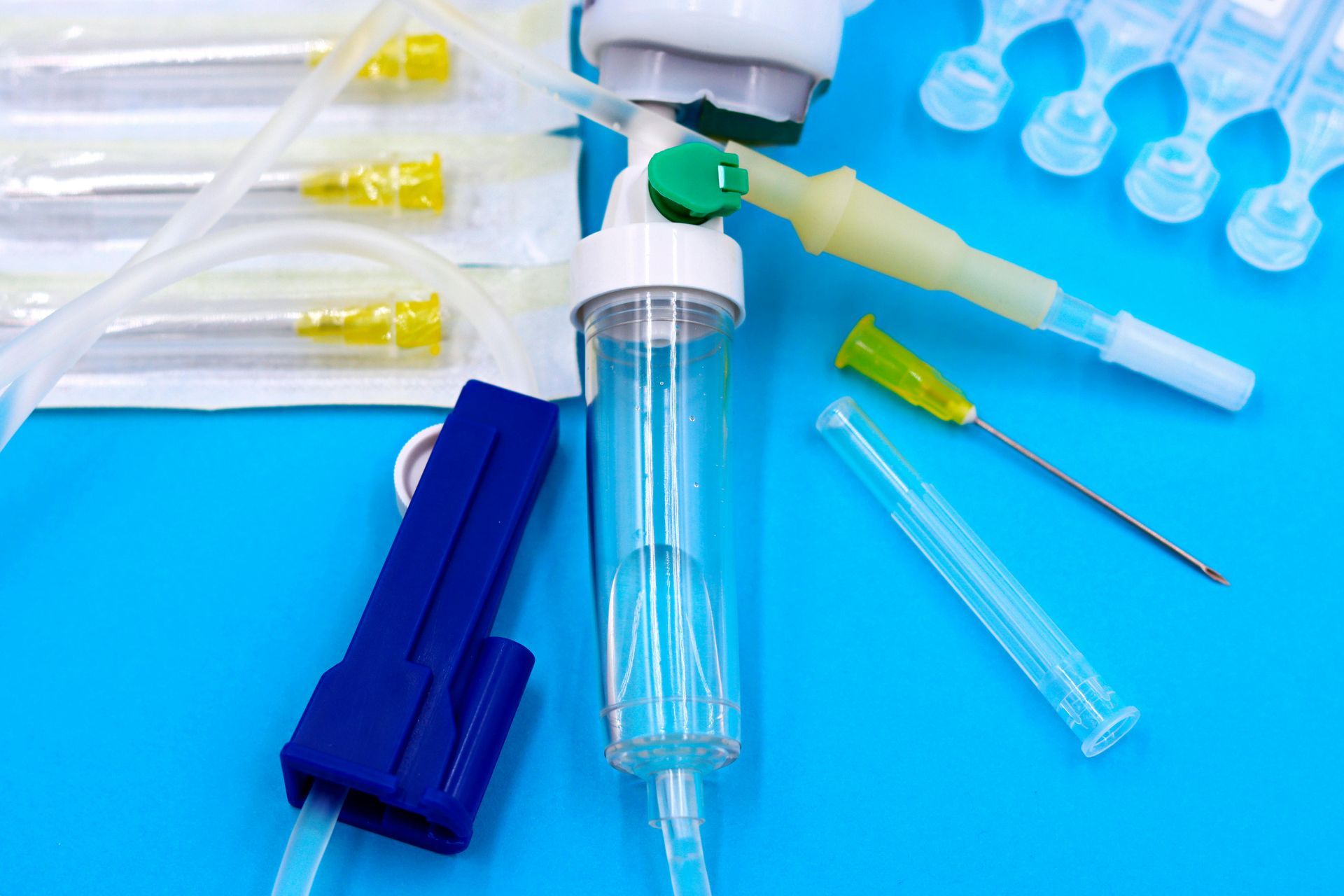Glutathione IV Therapy Side Effects and How to Minimize Them
Glutathione is one of the body’s most powerful antioxidants. Glutathione occurs naturally in the body, but levels can decline with age, stress, illness, or exposure to toxins.
While oral glutathione supplements are available, they are often broken down in the digestive system before reaching the bloodstream. This limits their effectiveness. Glutathione injections and glutathione IV infusions deliver it directly into the bloodstream, bypassing digestion for higher absorption.
Glutathione IV therapy is commonly used for:
- Skin health and skin brightening–supports even tone, reduces hyperpigmentation, and promotes natural skin whitening.
- Liver detoxification–supports liver function, enhances toxin clearance, and helps with chronic liver disease management..
- Immune function–reduces oxidative stress, strengthens defenses, and helps fight infections.
- Anti-aging and cellular damage repair–slows down free radical damage and protects brain function.
- Chronic pain and autoimmune disorders–sometimes used in supportive therapy for autoimmune diseases and inflammatory conditions.
While this glutathione infusion has become increasingly popular, it has potential risks and side effects.
Common but Mild Side Effects
Like any treatment, glutathione IV infusions may cause side effects. Most are temporary and mild, but it’s important to recognize them.
- Injection site discomfort–It’s common to feel slight pain, warmth, or see redness where the IV drip was inserted. A small bruise may appear afterward, just like with a routine blood draw. This usually resolves within a few days and can be eased with a warm compress.
- Nausea or bloating–Some people feel queasy during or immediately after the glutathione IV infusion. This may happen because glutathione interacts with detoxification pathways in the liver, which temporarily trigger mild digestive upset. Staying hydrated and eating a light meal beforehand often helps reduce these symptoms.
- Headache or dizziness–Rapid changes in blood pressure, hydration, or electrolyte balance during intravenous injections can cause mild headaches or lightheadedness. These effects are usually short-lived and improve with rest, fluids, or electrolyte replacement.
- Metallic taste–A temporary metallic or sulfur-like taste in the mouth is sometimes reported during IV infusion therapy. This happens because glutathione contains sulfur compounds that can briefly alter taste perception. It typically disappears once the session ends.
Rare but Serious Side Effects
Allergic Reactions
Although rare, some patients may develop allergic responses to glutathione or additives in the intravenous glutathione solution. Symptoms include itching, skin rashes, swelling, or difficulty breathing.
Severe reactions (anaphylaxis) are extremely uncommon but require immediate medical attention. This is why treatment should always be supervised by licensed professionals who can respond quickly.
Zinc Depletion
Long-term or frequent high-dose glutathione supplementation can reduce zinc levels in the body. Glutathione interacts with minerals, and over time, it may interfere with zinc absorption.
Low zinc causes hair loss, brittle nails, and weaker immune function. To prevent this, providers often recommend monitoring zinc status or combining glutathione supplementation with zinc supplementation.
Kidney or Liver Strain
Glutathione is processed through the liver and kidneys, which play central roles in detoxification and waste removal. In people with preexisting conditions like chronic kidney disease or liver cirrhosis, high-dose IV infusion may place additional stress on these organs.
While uncommon, patients with known health issues need to discuss risks with their doctor and undergo monitoring before and during treatment.
How to Minimize Glutathione IV Infusion Side Effects
Most side effects of intravenous glutathione are mild and manageable. By taking the right steps before, during, and after treatment, you will avoid discomfort and improve results.
- Start with lower doses–Jumping straight into high doses overwhelms your system, especially if it’s your first IV infusion. Starting with smaller amounts allows the human body to adjust gradually. This lowers the chance of nausea, dizziness, or headaches. Your provider will then increase the dosage over time if needed.
- Stay hydrated–Hydration prevents gastrointestinal distress, headaches, and dizziness. Drinking water before and after your IV infusion supports circulation and helps your kidneys flush out waste more effectively.
- Share your medical history–Conditions such as asthma, kidney disease, chronic pain, or liver problems affect how safely your body processes intravenous glutathione. When your provider has the full picture, they tailor your IV infusion and monitor you more closely to prevent complications.
- Combine with Vitamin C–Glutathione and vitamin C work hand-in-hand. Vitamin C helps regenerate glutathione once it’s used up. This combination will improve results and reduce oxidative stress, lowering the chance of immune-related side effects.
- Follow aftercare advice–Listening to your provider’s aftercare instructions is just as important as the session itself. Rest, hydration, and sometimes dietary support (like zinc or antioxidant-rich foods) help your body recover smoothly. Avoiding alcohol and smoking for at least 24 hours also reduces stress on the liver.
- Choose reputable providers–Always receive IV therapy from trained medical professionals. Proper technique reduces risks like vein irritation, infection, or incorrect dosing. Licensed providers also have emergency protocols in place in case of allergic reactions.
At Revive Mobile IV, treatments are delivered by licensed professionals. We come to you, providing safe, convenient, and personalized IV therapy in the comfort of your home. With professional monitoring and tailored treatment plans, you enjoy the benefits of glutathione IV therapy while minimizing risks.
Who Should Be Cautious With Glutathione IV Infusion?
Glutathione IV infusion is generally safe for most healthy adults, but some groups need extra caution or medical clearance before starting:
- Pregnant or breastfeeding women–There isn’t enough research to confirm that glutathione IV infusions are safe during pregnancy or while nursing. Since nutrients and medications can pass to the baby, it’s best to avoid treatment unless specifically recommended by a doctor.
- People with kidney or liver disease–Glutathione infusions can sometimes place additional stress on them. Patients with chronic kidney disease, dialysis needs, or advanced liver conditions should only consider IV infusion under close medical supervision.
- Those with a history of severe allergies–While allergic reactions are rare, people with past reactions to IV treatments, medications, or supplements may face a higher risk. Symptoms like rash, itching, or difficulty breathing require immediate attention, so a thorough allergy history is essential before starting.
- Individuals on certain medications–Some drugs may interact with antioxidant therapies. For example, chemotherapy patients should always check with their oncologist before starting glutathione IV infusion, as it may interfere with treatment effectiveness.
Always consult your doctor before starting systemic glutathione IV infusion, especially if you fall into any of these groups or have autoimmune diseases or neurodegenerative disorders. A personalized medical review ensures that the treatment is both safe and effective for your health needs.
When to Seek Medical Attention
While most people tolerate glutathione IV infusion well, there are rare situations where side effects may indicate a more serious reaction. Warning signs to watch for include:
- Severe allergic reactions–Swelling of the face, lips, or throat, hives, or difficulty breathing may signal anaphylaxis, a medical emergency.
- Chest pain or irregular heartbeat–These could indicate stress on the cardiovascular system and require urgent evaluation.
- Persistent or severe nausea and vomiting–Ongoing gastrointestinal issues after treatment may suggest that your body is not processing the infusion properly.
- Dizziness, fainting, or sudden weakness–These can be signs of blood pressure changes or an adverse reaction to the infusion.
- Unusual fatigue or jaundice (yellowing skin/eyes)–In rare cases, high-dose glutathione can stress the liver, and these symptoms should be checked by a provider.
If you notice any of these symptoms, stop treatment immediately and contact your provider or seek emergency care.
At the same time, most risks can be minimized when treatment is done by experienced professionals. That’s why many patients choose Revive Mobile IV. Our licensed providers ensure safe dosing, close monitoring, and high-quality care—all brought directly to your home for comfort and convenience.










